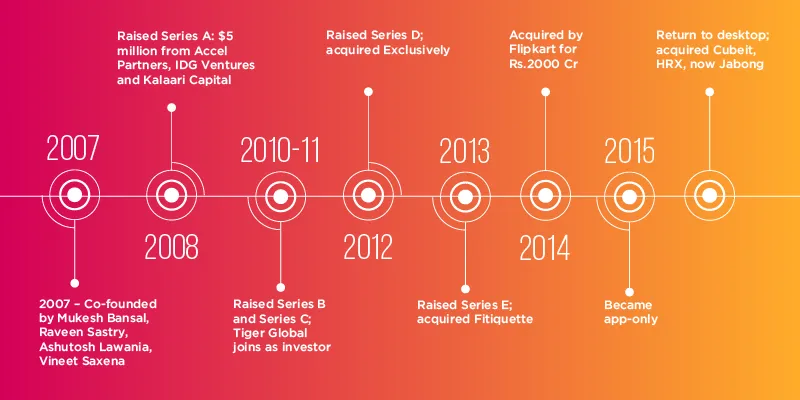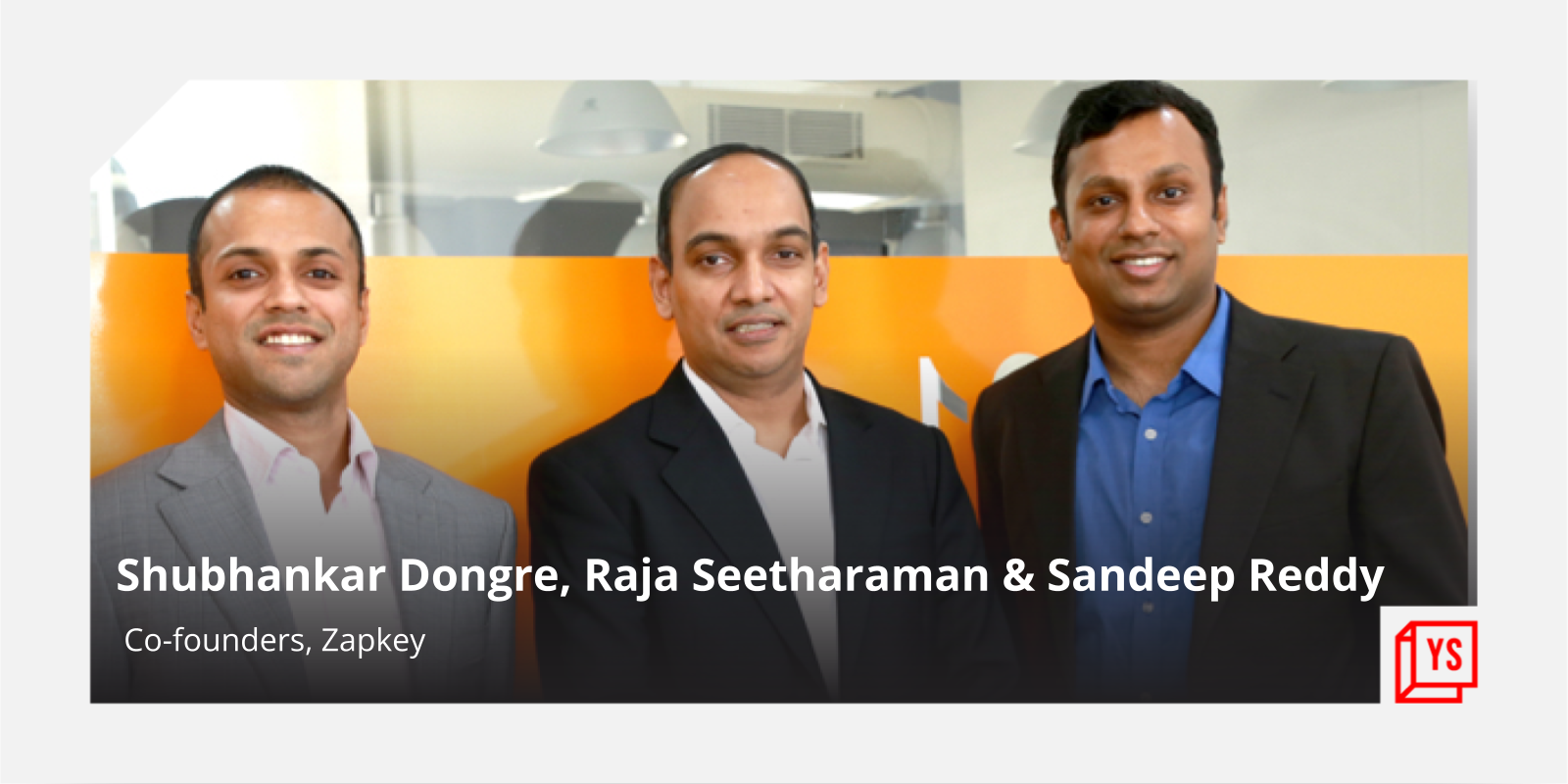Jabong’s acquisition could be Flipkart’s smartest move since it took over Myntra
Athira Nair

Wednesday July 27, 2016 , 6 min Read
The acquisition of online fashion portal Jabong by Flipkart-owned Myntra today might come as a surprise to many. But if you connect the dots, it is quite simply the best thing that could have happened for both companies.

Jabong, which according to sources raised about $250 million, got acquired at a price of $70 million in an all-cash deal. Sources say that it will continue as a separate entity, at least for now.
Flipkart had some great competition - Reliance Industries (which owns AJIO Life fashion portal), and Aditya Birla group were also contenders, along with Snapdeal, to buy Jabong. Although cost of customer acquisition has discouraged chairman Kishore Biyani from stepping into e-commerce, Future Group was also reportedly keen on the deal.
Traditional retail titans showing interest in buying Jabong is a matter of curiosity, but Flipkart/Myntra’s acquisition makes more sense for Jabong in terms of expertise needed for strategising in marketing, category management and logistics. After all, the offline leaders’ online presence has not had the impact that Flipkart or Myntra have had.
Experts agree that despite the tough phase, Flipkart is in a strong position of owning fashion compared to all other general merchandisers. Fashion is the highest margin category and it demands differentiation.
Praveen Sinha, Co-founder and former Managing Director of Jabong, told YourStory: “I was always convinced in terms of the fashion portals’ importance to general merchandiser. This acquisition, and interest from multiple players, confirms that view.”
Tough times
Jabong, owned by Global Fashion Group—a collaboration between Jabong investors Rocket Internet and Swedish investment bank AB Kinnevik—has been in trouble for quite a while. Despite GFG raising millions in the last one year, Jabong was facing severe fund crunch.
In an email to YourStory, GFG spokesperson said: "The transaction will de-consolidate our highest loss-making operation while delivering capital that can be deployed in high-return opportunities across GFG’s footprint." Jabong’s revenue reached €32.6 million in 1Q16, with an adjusted EBITDA of €-11.9 million or -36 percent, improving more than 20pp from 1Q15. The spokesperson added: “The level of competition in the Indian e-commerce market has been such that we have not recouped the capital invested. Deconsolidating Jabong will make GFG stronger and more effective in its ability to compete."
On the other hand, Flipkart too has had a tough year – with double devaluation, top leadership leaving, and tiffs with sellers. Reports have been echoing the possibility that the global giant Amazon might just overtake them as the largest marketplace in the country. But Flipkart does have an upper hand in one very important category – fashion. Its acquisition of Myntra in 2014 gave it an edge over both Snapdeal and Amazon.
Fashion contributes to 20 percent of GMV in online retail in India, and 37 percent of online retailers' revenues, according to a report by Redseer Consultants. Ensuring that Myntra remains the market leader is important for Flipkart’s sustainability. Experts agree that acquisition of Jabong effectively keeps Myntra uncontested- as no other fashion portal has that magnitude.
Arvind Singhal, Chairman for advisory firm Technopak, said: “Despite all the troubles Jabong is the second biggest name in fashion e-commerce after Myntra, especially from consumer point of view. Myntra has acquired Jabong so it doesn't fall into the hands of a competitor.” He added that there may not be an immediate impact in terms of turnover or in valuation for Flipkart.
Serial entrepreneur and angel investor Kashyap Deorah believes that this is a defensive acquisition to ensure the competitor does not get the business. “Flipkart is still focussed on GMV growth and this is a way to acquire growth when organic growth is slowing down,” he added.
The downward spiral
Started in 2012 by Praveen Sinha and Arun Chandra Mohan and incubated by Rocket Internet, Jabong had a visible edge over its competitor Myntra – which was a gift personalisation platform that then pivoted into a fashion marketplace model. Somewhere along the way, Jabong lost focus with indiscriminate expansion of product categories, brands, merchants, and discounting, and its sales growth fell to a mere seven percent in 2015, from 136 percent in 2014. The founders left the company in September 2015.
The grapevine was that GFG was not keen on its Indian business – they raised $339 million at a valuation of $1.13 billion (€1 billion) in April, followed by $25 million in July. In fact, GFG said today on its blog: “Following a strategic review of its Indian operation, the GFG Board concluded that Jabong’s position as India’s leading fashion e-commerce destination would be best served through a business combination with a local player. Having reviewed multiple options over a period of several months, the GFG Board has resolved to sell Jabong to Flipkart Group.”
To be fair, none of Rocket Internet’s bets in India had fared too well for them: Fabfurnish was sold for Rs 15 crore – while it had raised about ten times more than that, and Food Panda too is struggling.

Mukesh Bansal, Co-founder and former CEO of Myntra, said: “The deal helps consolidate Myntra and Flipkart's leadership position in fashion. Myntra has established, especially, in the last 18 months that it is the clear leader in fashion and acquiring Jabong will strengthen this.” He added that he has no direct knowledge of the deal.
Revival of Jabong
Jabong has been working on restructuring the business since Sanjeev Mohanty joined, starting with hiring the top leadership team. Former eBay India Head B Muralikrishnan joined as COO, and Snapdeal Category Management VP Rahul Taneja came in as CBO. Jabong had announced that it will be cutting down on low-margin brands to have better quality customers. But it did make a mistake by not capitalising on Myntra’s app-only strategy launched in 2015. “We lost sight of our core strength at the time, and lost the opportunity,” CEO Sanjeev had told YourStory in an earlier interaction.
More recently, there have been structural changes too. Jade Services, the B2B entity that owned Jabong, ran a B2C arm – Xerion Retail – which sold about 90 percent of retail till a few days ago. However, last week, Livemint reported that Jabong is shifting from its inventory-led model to a marketplace model to comply with rules on foreign direct investment (FDI). Xerion Retail has been replaced by three vendors- Bren Trading Pvt. Ltd, Ravenna Fashion Pvt. Ltd and Wearhouse Products Pvt. Ltd.
All these developments took place at a time when a PricewaterhouseCoopers investigation commissioned by Rocket Internet had found anomalies in the functioning of Jabong’s logistics arm GoJavas. Be that as it may, one cannot deny Jabong's value among customers. Therefore, the acquisition will surely help Myntra as much as it does Jabong. Ashish Kashyap, CEO, ibibo, noted:
It essentially consolidates Myntra's position in the fashion segment. With this deal, Myntra gets an incremental catalogue and supply power.
The question is, now that Flipkart pushed itself one more step ahead, what is the next move for Snapdeal and Amazon?










